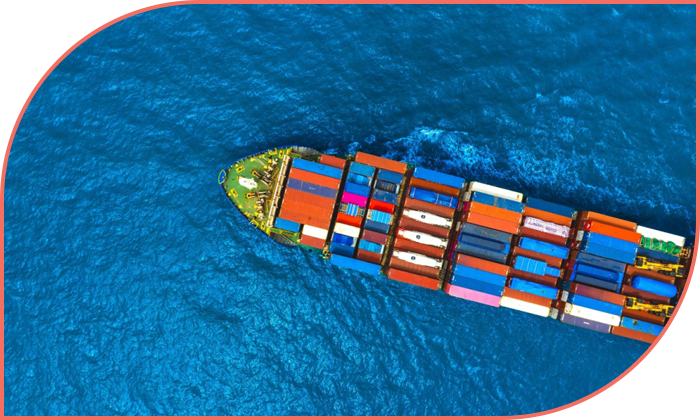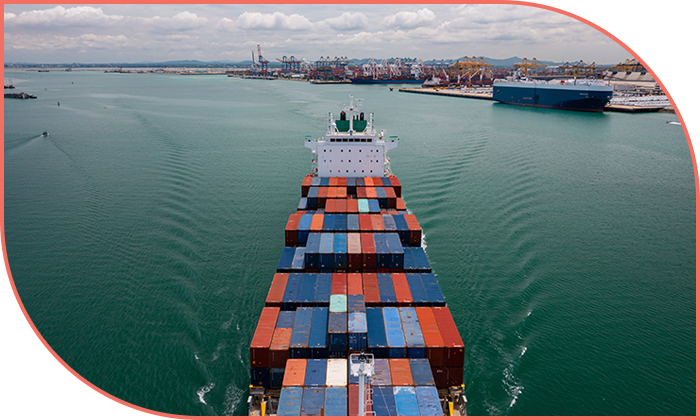Incoterms 2020 Guide
Incoterms definition
Incoterms in 2024 are a globally recognised set of rules established by the International Chamber of Commerce (ICC). These shipping terms define the responsibilities of sellers and buyers in international trade.
First introduced in 1936 (and regularly updated to reflect changes in global trade), Incoterms provide guidelines on the allocation of costs and risks associated with transporting and delivering goods.
Why are Incoterms essential in international trade?

In 2024, Incoterms help avoid shipping-related disputes by providing a common set of rules.
They are important because they delineate the obligations of each party in an international transaction precisely, including who is responsible for shipping, delivery, pick-ups, and packaging.
The simplicity of Incoterms streamlines the logistics of international trade by enhancing the reliability of the supply chain.
They are important because they delineate the obligations of each party in an international transaction precisely, including who is responsible for shipping, delivery, pick-ups, and packaging.
The simplicity of Incoterms streamlines the logistics of international trade by enhancing the reliability of the supply chain.
Compare Freight Shipping Rates in Seconds
Get instant quotes from leading ocean and air freight providers. Find the best rates for your shipping needs in one place.
The 11 Incoterms 2020 rules that can be used in 2024
Shipping Incoterms have various meanings, each describing the specific responsibilities of buyers and sellers.
FOB (Free On Board)
The seller delivers the goods onto the ship at the shipping port and covers all costs up to this point. After the goods are on board, the buyer takes over all risks and costs for transport and handling.
CFR (Cost and Freight)
The seller arranges and pays for transporting the goods to the specified port. Once the goods are loaded onto the ship, the risk shifts to the buyer. The buyer is then responsible for insurance and any extra costs.
CIF (Cost, Insurance, and Freight)
Similar to CFR terms, CIF requires the seller to pay for the freight to the destination port. Additionally, the seller must arrange marine insurance to protect against loss or damage during transit. The risk transfers to the buyer once the goods are loaded onto the ship.
CPT (Carriage Paid To)
Under CPT, the seller pays for transport to the named port. Risk transfers to the buyer when the goods are handed over to the first carrier, not when they reach the destination.
CIP (Carriage and Insurance Paid To)
CIP is similar to CPT, but the seller must also obtain insurance for the buyer’s benefit, covering the goods during transport.
EXW (Ex Works)
Under EXW terms, the seller's responsibility is minimal. They only need to make the goods available for pickup at their premises or another named place (factory, warehouse, etc.).
The buyer bears all costs and risks associated with transportation from that point, including loading the goods onto a vehicle and export procedures.
The buyer bears all costs and risks associated with transportation from that point, including loading the goods onto a vehicle and export procedures.
FCA (Free Carrier)
FCA requires the seller to deliver the goods to a carrier or another party at a named destination. Risk transfers to the buyer once the goods are handed over to the carrier.
DAP (Delivered at Place)
Under DAP, the seller is responsible for delivering the goods to a specified location.
The seller covers all costs and assumes all risks up to the point of delivery, excluding import clearance, duties, and unloading. The buyer handles the import customs formalities and unloading of the goods.
The seller covers all costs and assumes all risks up to the point of delivery, excluding import clearance, duties, and unloading. The buyer handles the import customs formalities and unloading of the goods.
DPU (Delivered at Place Unloaded)
DPU is like DAP but includes unloading at the destination. The seller covers all transportation and unloading costs and risks. The buyer handles import duties and any further transportation from the unloading location.
DDP (Delivered Duty Paid)
DDP means the seller has the most responsibility.
The seller delivers the goods to a specified place in the buyer's country, covering all costs and risks, including import duties and taxes. The seller handles customs clearance, pays all duties, and delivers to the buyer's location. The buyer is only responsible for unloading.
The seller delivers the goods to a specified place in the buyer's country, covering all costs and risks, including import duties and taxes. The seller handles customs clearance, pays all duties, and delivers to the buyer's location. The buyer is only responsible for unloading.
FAS (Free Alongside Ship)
FAS requires the seller to place the goods alongside the vessel at the named port of shipment. The seller covers all costs and risks up to this point, including export clearance. The buyer assumes all subsequent costs and risks from this point onward.
How do Incoterms affect your shipping cost?
Shipping incoterms in 2024 are invaluable to determining costs between buyers and sellers.
Which shipping terms you choose impacts several cost factors, including transportation, insurance, duties, and handling charges. Different arrangements can minimise the buyer's cost exposure but require the seller to bear significant expenses, and vice versa.
For instance, under the FOB terms, the seller is responsible for all costs up to the point where the goods are loaded onto the vessel.
DDP terms, however, place the maximum responsibility on the seller, who covers all costs and risks associated with delivering the goods to the buyer's premises.
Which shipping terms you choose impacts several cost factors, including transportation, insurance, duties, and handling charges. Different arrangements can minimise the buyer's cost exposure but require the seller to bear significant expenses, and vice versa.
For instance, under the FOB terms, the seller is responsible for all costs up to the point where the goods are loaded onto the vessel.
DDP terms, however, place the maximum responsibility on the seller, who covers all costs and risks associated with delivering the goods to the buyer's premises.
Get The Best Freight Rates Today
Easily compare rates from top ocean and air freight carriers. Save time and money on your next shipment.
When were Incoterms invented?
While shippers today use the latest set of terms (Incoterms 2020), the first set was published in 1936 by the International Chamber of Commerce (ICC). Over the years, the meaning of Incoterms have been periodically revised to reflect changes in international trade practices.
Significant revisions occurred in 2010 and, most recently, in 2020. Each revision has aimed to clarify the rules to accommodate new forms of transport and logistical changes.
Significant revisions occurred in 2010 and, most recently, in 2020. Each revision has aimed to clarify the rules to accommodate new forms of transport and logistical changes.
What are Incoterms 2010?
The most recent revision of shipping Incoterms occurred in 2010. In this version, the ICC introduced two new terms, Delivered at Terminal (DAT) and Delivered at Place (DAP), replacing four outdated terms.
Should you use 2010 Incoterms after 2020?
While using the 2010 is possible, it’s generally recommended to use the most current set, which in this case is the Incoterms 2020.
What are Incoterms 2020
Effective from January 1, 2020, Incoterms 2020 maintains the same eleven rules as the 2010 version but introduces several key updates to reflect modern trade practices.

Incoterms 2020 - For any type of transport
Shippers will need to choose the 2020 Incoterms relevant to their transport method. While some shipping terms cannot be used across all modes of transport, the following can be employed for ocean and air freight:
- CIP (Carriage and Insurance Paid To)
- CPT (Carriage Paid To)
- DAP (Delivered at Place)
- DDP (Delivered Duty Paid)
- DPU (Delivered at Place Unloaded)
- EXW (Ex Works)
- FCA (Free Carrier)
- CIP (Carriage and Insurance Paid To)
- CPT (Carriage Paid To)
- DAP (Delivered at Place)
- DDP (Delivered Duty Paid)
- DPU (Delivered at Place Unloaded)
- EXW (Ex Works)
- FCA (Free Carrier)
Find The Lowest Freight Rates Today
Compare shipping quotes from trusted providers. Get the best deals for ocean or air freight.
Incoterms 2020 - For sea transport
These four Incoterms 2020 can only be utilised for ocean and inland waterway shipments:
- CIF (Cost, Insurance, and Freight)
- CFR (Cost and Freight)
- FAS (Free Alongside Ship)
- FOB (Free On Board)
Incoterms 2020 - For air freight
The following shipping terms can be used for air freight shipments:
- CIP (Carriage and Insurance Paid To)
- CPT (Carriage Paid To)
- DAP (Delivered at Place)
- DDP (Delivered Duty Paid)
- EXW (Ex Works)
What do shipping Incoterms not cover?
Understanding what Incoterms don’t cover is equally important.

Transfer of ownership
They don’t address the transfer of ownership or the passage of title to the goods. The point at which the ownership of the goods transfers from the seller to the buyer must be defined separately within the sales contract through a "retention of title" clause.
Insurance
Incoterms do not inherently cover insurance, except in the cases of CIF (Cost, Insurance, and Freight) and CIP (Carriage and Insurance Paid To), where the seller is responsible for obtaining insurance for the goods.
For other Incoterms, the responsibility for insurance must be agreed upon separately between the buyer and seller.
Payment
Incoterms in 2024 don’t stipulate the terms of payment between the buyer and the seller. Payment terms, including the price of the goods, the payment schedule, and the method of payment, need to be negotiated and specified separately in the contract.
Shipping Made Simple: Compare Quotes Now
Quickly compare ocean and air freight quotes from multiple carriers. Get the most competitive price for your shipment.